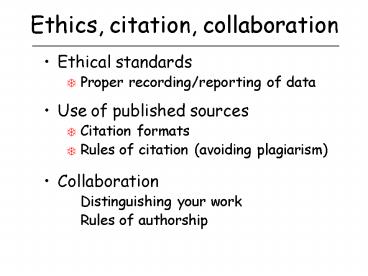Ethics, citation, collaboration
1 / 6
Title:
Ethics, citation, collaboration
Description:
... it ('avoiding plagiarism is not an exercise in inventive paraphrasing UBC guide) ... orchids have modified typical flower parts, like petals, into specialized ... –
Number of Views:76
Avg rating:3.0/5.0
Title: Ethics, citation, collaboration
1
Ethics, citation, collaboration
- Ethical standards
- Proper recording/reporting of data
- Use of published sources
- Citation formats
- Rules of citation (avoiding plagiarism)
- Collaboration
- Distinguishing your work
- Rules of authorship
?
?
?
2
Online Writing Lab, Purdue University
3
Guidelines for citationLearn how to declare
your intellectual debts-Northwestern University
Writing Program
- Exact phrases
- always put in quotes
- avoided wherever possible
- Paraphrasing
- do read, compose from your own thoughts, check
text - do not copy text and alter it (avoiding
plagiarism is not an exercise in inventive
paraphrasingUBC guide) - Information that is generally known
- generally does not need citation
- interpretations of such information should be
cited
4
Plagiarism how fine a line?
Imagine that Smith (2002) includes the following
sentence Orchids manufacture the intricate
devices they use for pollination from the common
components of ordinary flowers. Which of the
following constitute plagiarism, and why?
Orchids manufacture the intricate devices they
use for pollination from the common components of
ordinary flowers (Smith, 2002). Orchids
manufacture, from the common components of
flowers, their complex pollination devices
(Smith, 2002). Orchids assemble the convoluted
structures they use for pollination from the
general apparatus of average flowers (Smith,
2002). Smith (2002) states that orchids
manufacture their intricate devices from the
common components of ordinary flowers. During
their evolution, orchids have modified typical
flower parts, like petals, into specialized
pollination structures (Smith, 2002).
P
P
P
Avoid
?
5
Citation scenarios when is citation necessary?
- You bump into someone in the hallway who provides
an important interpretation of your data - You read about an idea in a popular magazine that
gets you thinking differently about your research - You describe in your thesis a gene interaction
that you learned about in one of your classes - You make use of an unusual metaphor described in
a paper that you think perfectly captures the
essence of an important concept
6
Ethics, citation, collaboration
- Ethical standards
- Proper recording/reporting of data
- Use of published sources
- Citation formats
- Rules of citation (avoiding plagiarism)
- Collaboration
- Distinguishing your work
- Rules of authorship
- ?conceptual planning, data collection, analysis,
writing, funding
?
?
?
?
?































